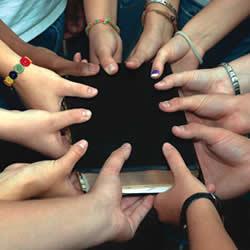This summer I attended a prayer vigil following the death of a 19-year-old Hmong man named Fong Lee who was killed by a police officer after supposedly fleeing from a drug deal. It had been a hot and deadly summer in my home city of Minneapolis.
When I first arrived at the event — held at the elementary school that was also the scene of the shooting — I must admit I was nervous. I didn’t see any other African-Americans. Even though Minneapolis is culturally and ethnically diverse, when it comes to the churches, families and community groups that make up the inner city, it remains very segregated.
It dawned on me that prayer gatherings for urban youth who die before their time should be the last place for social segregation. I use the term social segregation, because legal segregation is a thing of the past, or at least that’s the claim. Social segregation, though, has lived through the civil rights movement and other events like the multiethnic male gatherings of Promise Keepers.
You might ask why I was even at the mostly Asian-American vigil. City Councilmember Don Samuels, who attends my church, suggested I go. Don still has visions of the Beloved Community that Dr. Martin Luther King Jr. spoke of years ago. I too hold on to this vision: of a Christ-centered, multi-ethnic community engaged in evangelism, a holistic model of local missions and reconciliation, with youth at the forefront.
When Don and his wife, Sondra, arrived, he asked me if I would be willing to pray. I said ‘yes’ reluctantly. Don began to speak to the crowd through an interpreter about the need for justice, healing, truth and a unified community. Then he handed the microphone to me. I bowed my head and then prayed one of the hardest prayers I’ve ever had to pray.
All I remember was asking God’s grace, healing, mercy and reconciling power to move in our community. I fumbled through asking God to provide comfort to the grieving parents. I prayed for the police officer who shot Fong Lee. I prayed for people caught in a cycle of despair and violence. I prayed for parents there who might feel detached from their own kids but unable to express it, and then finally, amen.
When I looked up, the parents of Fong Lee were there to thank me and give me a hug. When I left the gathering there were many thoughts on my mind.
One, the prayer gatherings of the Christ-centered, multi-ethnic, urban and reconciling community must begin before young people die and not after the fact. These prayer gatherings must be directed around repentance, asking God for a proactive strategy for faith-based community and family development and the breaking of generational curses which keep inner cities trapped in spiritual oppression.
Second, we as leaders in urban churches must commit ourselves to break out of the matrix of race and segregation. There is a multi-ethnic generation of urban youth dealing with disconnected fathers, the glamorization of gang and pimp life and violence as the primary means for solving conflict.
To deal with these issues from a context of racial isolation misses the blessing of seeing God’s Spirit moving through the Beloved Community. There is a great need for urban pastors and youth workers to develop strong networks, collaborative ministry models and authentic relationships which point to true Christian community. This could fuel an evangelistic revival, community development projects and a holistic approach to Kingdom advancement and transformation.
If there was ever a time for the Christian church to stand united as a reconciling force of prayer and transformation in our inner cities, it’s now.
____________________
Efrem Smith is the senior pastor of The Sanctuary Covenant Church (sanctuarycovenant.org) and the founder of Unity Storehouse Ministries (unitystorehouse.com). He is the author of Raising Up Young Heroes and The Hip Hop Church (with Phil Jackson). He also hosts the radio show “Time for Reconciliation.”




